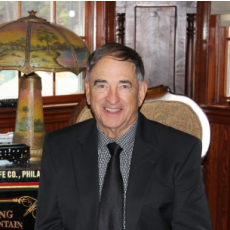Tell us about your journey of starting Reading Blue Mountain and Northern Railroad?
I started the company in 1983, and it has been quite the journey. I grew up in a small town, Hamburg, Pennsylvania, in a middle-class neighborhood. As a kid, I had a passion for collecting coins, which eventually led me to realize that I could buy and sell them for profit. This entrepreneurial spirit carried me through college, where I earned enough buying and selling rare coins to help pay for my education. After college, I taught fifth grade for four years but soon found that my coin business was making more money than teaching. With my wife's support, I left teaching and dove into the gold and silver business, where I found great success. By 1981, I had retired with a significant amount of money but no real direction. One night in a bar, someone mentioned they were going to tear out a railroad near my hometown, and on a whim, I decided to buy it. The next day, I walked 13 miles of the track with my wife and called Penn Central to purchase my first railroad. It was a small 13-mile track, but that was the start of Reading Blue Mountain and Northern Railroad. Initially, it was just something to play with—I had no idea it would grow into the large operation it is today.
What drives your curiosity in these niche pursuits like coins, railroads, and aviation?
My entire life has been shaped by an inherent entrepreneurial spirit, something I believe I inherited from my parents. I never wrote a resume, and I never had a formal job interview. I just followed my interests—whether it was coins, airplanes, or trains—and every hobby turned into a business. I think entrepreneurs are born, not made, and for me, it’s always been about passion. I never chased money, yet somehow, everything I was passionate about became profitable.
I’ve been flying for over 40 years now, and even though my aviation business wasn’t as lucrative, it was another passion of mine. I own my own jet and fly all over the country. I think it's the love of these interests that naturally evolves into business opportunities. I never really set out to make it happen—it just did.
You’ve made several significant acquisitions over the years. What is your current operation like?
After buying my first small railroad in 1983, I gradually expanded. In the 1980s, nobody wanted these railroads because they were in bad shape, so I took the opportunity. I got to know people at Conrail and made my first big acquisition in 1990, buying 125 miles of track, and I used the money I made in the coin business to fund it. Over the years, I continued to buy more lines, and today, Reading and Northern has about 400 miles of track. We move a variety of goods, but our main commodity is anthracite coal. We're the sole operator for every anthracite mine in North America, all located in eastern Pennsylvania. The demand for coal, especially after the start of the Ukraine war, has skyrocketed, and our operation has grown significantly. We used to move about 400,000 tons of anthracite annually, and this year, we expect to move over 1.4 million tons.
Are you seeing increased demand for rail services over trucking, especially due to sustainability concerns?
Yes, there has been growing demand for rail transport as people are becoming more aware of sustainability issues. Railroads are far more efficient than trucks when it comes to moving large quantities of goods over long distances. However, trucks are still our main competition—they’re quick, nimble, and can adjust routes easily, making them tough to beat in some situations. We’ve had to remain competitive with pricing, and when time isn't a critical factor, we usually win.
Our location in eastern Pennsylvania, between New York and Philadelphia, positions us well for transloading, which means we handle goods that are transferred between rail and trucks. Our revenues have grown significantly in recent years, almost like a tech company, which is pretty remarkable in the old-world business of railroads.
With your growth, are you looking to expand into other modes of transportation?
Absolutely. About five years ago, I started a small trucking company to complement our rail services. We handle everything from steel to paper products and have invested in warehousing and storage for companies like Procter & Gamble. We do it all ourselves—no contractors—which gives us more control over the operation and improves customer satisfaction.
Our trucking company isn't massive, but it’s allowed us to offer a full range of services, including transloading and last-mile delivery. We’re always looking for ways to add value to our customers, and being able to handle all aspects of their logistics needs is part of that strategy.
What keeps you up at night, and how do you deal with challenges in your business?
Honestly, nothing keeps me up at night. I sleep like a baby. After years of being a commodity trader, I learned to handle stress, and now, I just don’t let things bother me.
I have full confidence in my team and the culture of safety we’ve built over the years. I wake up early because I’m excited to get to work, but that’s about it. I think the key to overcoming challenges is simple: build a business you’d send your own mother to. If you operate with that mindset, everything else falls into place.
My last major challenge was selling my aviation company, which was frustrating because it was on a public airport, meaning I had no control. After I sold it, I started sleeping even better. Challenges in the railroad business come up every day, but I view them as part of the fun rather than stress.
Looking ahead, what’s next for you and Reading and Northern?
Personally, I still enjoy trading gold and silver, which remains a hobby of mine. As for the railroad, if a good opportunity comes up—like another railroad for sale in my region—I’d certainly be interested. But I’m not actively seeking more challenges. I also own a large bison ranch in Nebraska, so between that and the railroad, I keep busy. I’m fortunate that everything I’ve been passionate about has turned into a successful business. For now, I’m just enjoying the ride and focusing on what’s in front of me, whether that’s expanding our freight operations or working on my next passion project.





